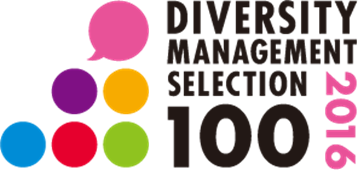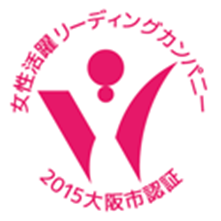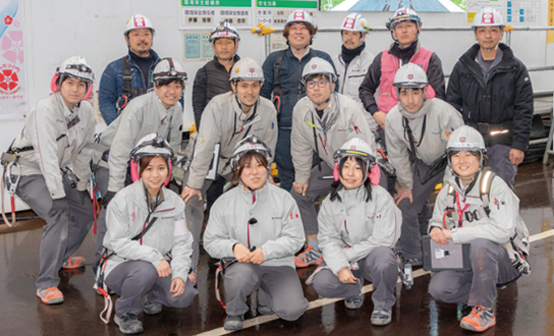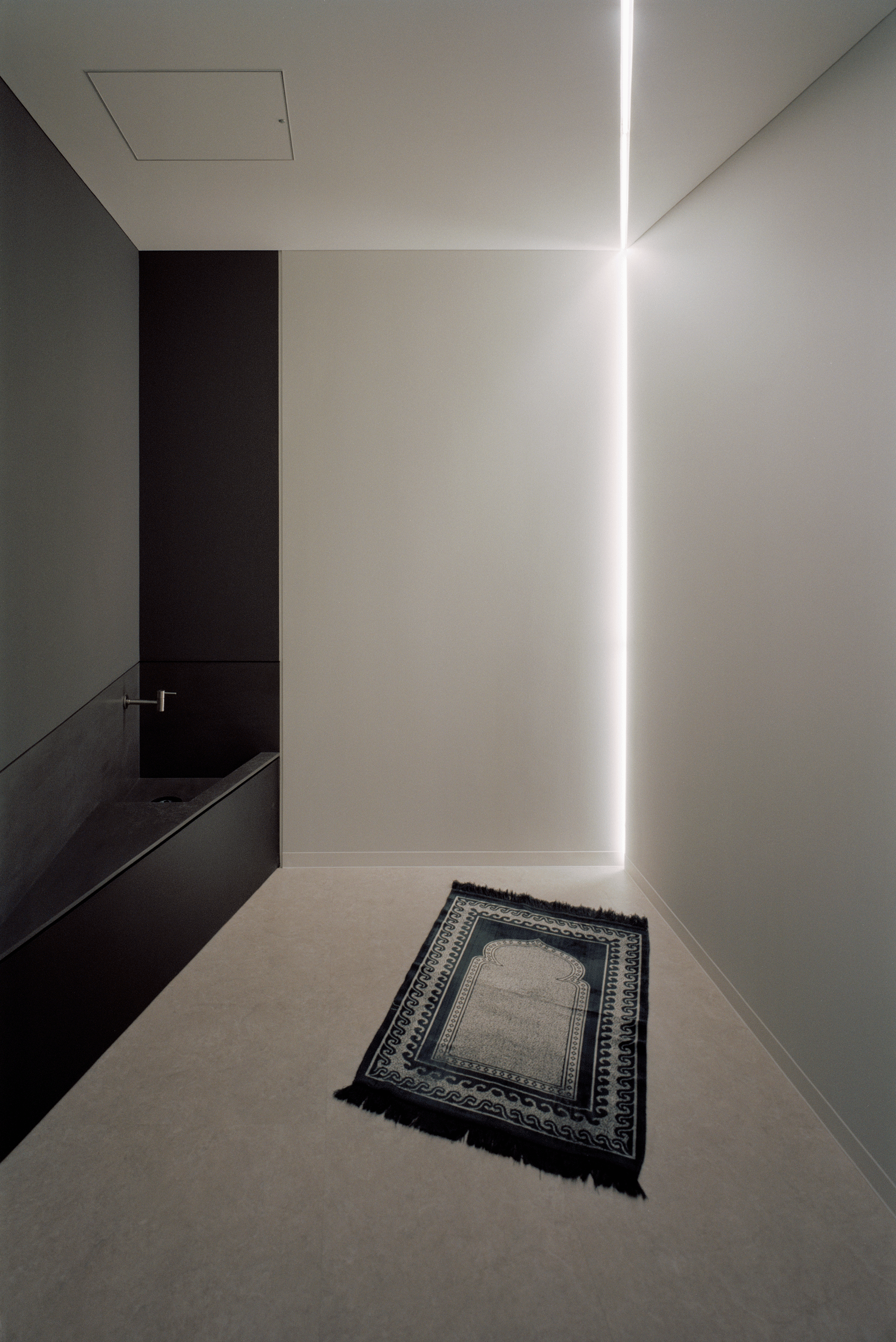Diversity & Inclusion
Contents
- Ⅰ. Diversity & Inclusion Promotion Policy
- Ⅱ. Changes in our company’s diversity promotion
- Ⅲ. Women's empowerment
- Ⅳ. Active participation by diverse human resources
- Ⅴ. Support for balancing work and family
- Ⅵ. Work-family balance support system (childcare related)
- Ⅶ. Support system for balancing work and home life (nursing care related)
Ⅰ. Diversity & Inclusion Promotion Policy
Takenaka Corporation is committed to creating a workplace environment where everyone can work with enthusiasm and a sense of fulfillment regardless of gender, nationality, age, disability, sexual orientation, gender identity, etc. With the goal of improving productivity and enhancing "job satisfaction" and "fulfillment" while respecting diversity, we will strengthen our system for promoting work style reforms in order to create workplaces where flexible work styles become a reality.

Ⅱ. Changes in our company’s diversity promotion
1st stage (centered on positive actions)
2010
Reorganization of employee classifications and
introduction of a region-specific management system
2011
Company newsletter, Diversity special feature
2012
Acquired certification as a company that supports raising the next generation (nicknamed Kurumin certification)
2013
Next-generation female leader development training (selective type)
*W-LEAP training
(Women's Leadership Enhancement and Action Program)
50 participants, 28 of whom were promoted to senior positions


2nd stage (efforts to foster awareness through instruction and educational activities)
2014
・Stakeholder dialog held (CSR activities)
Theme: “Diversity from the perspective of promoting active participation by female employees”
・Dialog held at seven branches with two parts: one for female employees and one for department managers
April 2014
- Diversity Promotion Group established as a dedicated organization within the Human Resources Department at our Head Office
- Appointed persons in charge of diversity promotion at 7 branches, and held
diversity promotion manager’s meetings
2015
・Message from the president
・E-learning (all employees)
・Diversity line manager training (all managers)
・Rank-based training for female employees
・Dialog held for executives and general managers
Theme: "Work-life balance"
・Chosen as a Diversity Management Selection 100s company
・Certified by Osaka City as a Leading Company in Promoting Female Participation


3rd stage (continuing efforts to foster awareness through instruction and educational activities)
2016
・ Expansion of work-life balance support systems, such as introducing a job return system and systems for operating locations and offices
・ Formulation of a voluntary action plan based on the Act on Promotion of Women's Participation and Advancement in the Workplace
・ Opening of a new Komachi Room (a women-only space)
2017
・ Clear statement of "improving work-life balance” in the Group Policy and the President’s Policy.
・ Establishment of the Committee for Improving WLB through Fundamental Companywide Productivity Improvements, chaired by the president.
・ Won the Equal Employment/Work and Harmonization Prize (Equality Promotion Planning Department, Minister of Health, Labour and Welfare’s Excellence Award)
・ Women's Empowerment Promotion Forum 2017 held
2018
・New prayer room and universal restrooms installed at the Tokyo Main Office
・Women's Empowerment Promotion Forum 2018 held

4th stage (from promoting women's empowerment to diversity)
2019
・Diversity Promotion Forum 2019 held
2020
・Diversity Promotion Forum 2020 held
2023
・Established WLB Central Committee, chaired by the president
・Received Award for an Organization Supporting Brilliant Female Researchers

Ⅲ. Women's empowerment
From early on, we have been focused on efforts to promote the advancement of women and expand their roles. In order to build a foundation for future female advancement, we are working to improve the percentage of female employes and managers by increasing recruitment of career-track female employees, expanding job scopes, and supporting employment continuation, as well as introducing training to develop female leaders.
At the same time, in order to create a comfortable work environment for both men and women, we have established a cross-departmental working group to promote the advancement of women, and a work-life balance working group. We have also been endeavoring to facilitate frank opinions of employees being conveyed to the company.


1. Providing comfortable working environments
Opening a new Komachi room
In response to requests from female employees for "a space to rest when feeling unwell and express for infants," we created a new rejuvenation space exclusively for women with the goal of providing a healthy work environment where employees could work with peace of mind.


Activities of Kensetsu Komachi

In the construction industry, where the ratio of male employees is considered to be high, we are continuing to create environments where women can play an active role in the workplace by promoting the activities of our Komachi Construction Team. We are providing settings where women can work comfortably, such as installing women-only rest areas and restrooms at work site offices.
- Komachi construction is a nickname for all women working in the construction industry.
Ⅳ. Active participation by diverse human resources
1. Seniors
・Extending retirement age
In order to fully utilize the abundant experience and skills of our senior employees, we introduced a system to extend our retirement age to 65 from April 2022. In this way, we are building a system that allows employees of all generations to play an active role.
・Holding life planning seminars
We aim to be "a company where people can work with peace of mind and enjoy fulfilling lives both at home and work." Meanwhile, in an era when people are living to the age of 100 with the social environment changing greatly, it is important for our employees to build "life plans" that are in line with their own values and outlook on life. In order to make this a reality, we hold seminars to examine economic aspects and review life planning.
2. LGBTQ
We are working to provide comfortable work environments by installing private restrooms that are wheelchair and LGBTQ accessible to everyone, regardless of gender. Utilizing the design know-how that we have accumulated, our designs take into consideration psychological stress, especially for LGBTQ people.
3. Global
A prayer room has been set up at our Tokyo Main Office (central building) in order to make the facility a comfortable place to work for global personnel. It is open to all religions and denominations, and is equipped with prayer mats, a place to remove shoes where feet can be cleansed before prayer, and a watering place. We also provide halal food to Muslim employees at our Fuake Dormitory for new employees.

4. People with disabilities
In addition to actively working to hire people with disabilities, we are revising and strengthening various systems to enable active participation by diverse human resources.
・Promotion of employment and retention of people with disabilities
We respect individual diversity and actively recruit for positions that allow us to maximize our capabilities. With a five-year retention rate of 80 percent for employees with disabilities, moreover, there exists an environment where people can continue to be active for a long time regardless of the nature of their disability.
・Establishment of an internal consultation desk
A disability consultation desk has been set up at each operating location to appropriately respond to concerns from employees with disabilities.
・Use of voice recognition app UD Talk
We are deploying a voice recognition app UD Talk companywide in order to further communication and work style reform for employees with hearing disabilities and their departments.

Ⅴ. Support for balancing work and family
In an effort to support balancing work and childcare, in 2020, we introduced teleworking and a flextime system with shorter working hours for childcare and nursing care, variable working for others, and annual paid leave on an hourly basis for all employees, thereby enabling flexible work styles. In response to a 2022 revision of the Act on Childcare Leave, Caregiver Leave, and Other Measures for the Welfare of Workers Caring for Children or Other Family Members (Child and Family Care Leave Act), moreover, we have been working to disseminate our systems internally. By fostering a workplace environment where it is easy to use these systems, there has been an increase in the number of men taking childcare leave.

Ⅵ. Work-family balance support system (childcare related)
Requests related to pregnancy/childbirth (self or spouse)
When an employee reports that she or a spouse is expecting a child, the company explains the childcare leave system, how to apply, benefits, and the handling of social insurance premiums during the leave period. At this time, the company will also inquire about the employee's intentions for taking childcare leave.
Changing work starting time for medical examinations
If female employees who are pregnant or within one year of childbirth need to undergo a medical checkup, they can go to the hospital during regular working hours by changing their start and end times.
Staggered commuting
Female employees who are pregnant can request staggered commuting to avoid using crowded public transportation.
Unscheduled breaks
Female employees who are pregnant can take breaks outside of their regular break periods without changing their regular working hours.
Changing to easier work
Female employees who are pregnant can request a change to easier work.
Exemption from overtime, late-night, and holiday work
Female employees who are pregnant or within one year of childbirth can request exemption from overtime work, late night work, and holiday work.
Measures against unsafe work conditions (staggered commuting/unscheduled breaks/holidays)
Female employees who are pregnant or within one year of childbirth can take necessary measures against any work condition that may be detrimental to their health as recommended by a physician or other health care provider.
Prenatal leave, postnatal leave, delivery leave for fathers
Prenatal leave can be taken from 6 weeks prior to the expected date of delivery (14 weeks in the case of a multiple birth). Then working is not allowed for eight weeks from the day of giving birth. Fathers can also take up to two consecutive days of leave to witness the birth of their children.
Childcare leave
While on childcare leave, salary is not paid, but if certain requirements are met, Basic Childcare Leave Benefits will be provided through the government employment insurance.
Shorter flextime working hours
Employees who are raising children up until the start of junior high school can use both shortened work hours and flexible work hours to enable them to work according to their daily childcare situation.
Childcare flextime
Employees who are raising children up until the start of junior high school can work flextime for the purpose of balancing work and childcare if the company recognizes that regular work hours are difficult and if it does not interfere with their job performance.
Limits on overtime work
Employees who are raising children up until the start of junior high school can request limits on overtime work, unless it interferes with normal business operations.
Limits on late night work
Employees who are raising children up until the start of junior high school can request limits on late-night work.
Exemption from overtime work
Employees who are raising children up until the age of junior high school can apply for exemption from overtime work.
Childcare time
Female employees who work while raising a child under one year of age can in principle take up to 30 minutes of childcare time twice a day.
Nursing leave
Employees who are caring for children who have not yet entered elementary school may request up to five days of leave per year (up to 10 days if there are two or more children who have not yet entered elementary school) for the child's nursing care. This is in addition to annual paid leave.
Working remotely
This is a system that allows employees to work from home if they are unable to come to the office due to childcare obligations if they have planned the work to be performed at home in advance.
Transfer exemptions
Employees who are about to give birth or are raising children can apply for an exemption from relocation.
Career Support and Job Return
Career Support is a system to provide consultation to employees who have concerns about their career development, such as taking leave for childcare. Job return is a system that provides employees who have left the company due to unavoidable circumstances, such as childbirth or childcare, with an opportunity to later return and contribute with their abilities.
Daycare concierge service (Mothernet)
This is a service to provide support for enrolling children in daycare so that employees can return to work. Experienced staff will not only provide nursery school information tailored to local circumstances, but they will also listen to employee wishes and then provide advice on childcare and other related topics.
Introduction of babysitter coupons from the Children and Families Agency (previously from the Cabinet Office)
Takenaka became an approved employer for "babysitter childcare support services to help balance work and childcare," which is implemented by the All Japan Childcare Service Association (AJCSA). When our employees receive in-home childcare services from a babysitting service provider that is certified by the AJCSA, they can use their "babysitter dispatch service coupons" to reduce the financial burden of childcare.
Information on life support useful for childcare
The Takenaka Group has a contract to use WELBOX, which introduces a variety of childcare-related services, as a benefit service available to employees.
Ⅶ. Support system for balancing work and home life (nursing care related)
Nursing care leave
Nursing care leave is useful for spot caregiving, such as accompanying a patient to the hospital or filling in for another family member who is providing care. In addition to regular paid holidays, employees can take up to five more paid holidays per year (up to 10 days if there are two or more people being cared for).
Family care leave
This Family Care Leave System is to be used by employees for providing care to a family member in need of nursing care for an extended period of time. Each eligible family member can receive the benefit up to three times, for a total of 365 days.
Limits on work outside of scheduled working time
This system allows employees to be exempted from working outside of the scheduled working hours set by the company, thereby making it easier for them to ensure the time necessary for nursing care.
Limits on overtime work
Employees who apply for family care will not be required to work more than 24 hours of overtime per month or 150 hours per year, except when it interferes with the normal operation of business.
Limits on work late at night
Upon applying to care for family members, employees will not be required to work between 10:00 p.m. and 5:00a.m. (late night shifts), unless it interferes with the normal operation of business.
Shorter working hours
This is a system that allows employees to shorten their scheduled working hours if they apply to care for a family member, unless it interferes with the normal operation of the business.
Shorter flexible working hours
This system allows employees to shorten their regular daily working hours and set flextime in order to care for family members.
Flextime
Upon applying to care for family members, this system allows employees to use flextime, except when it interferes with the normal operation of business.
Employee benefit services useful for nursing care
We have a contract to use WELBOX, which introduces a variety of services related to nursing care, as a benefit service available to our employees.
